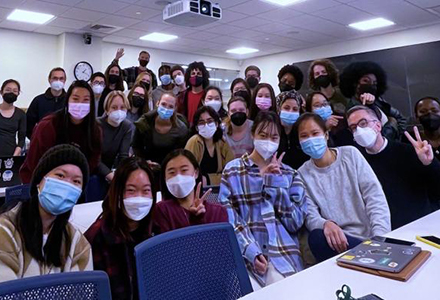New AccessComputing Videos and Webinars

Videos
- Mentoring Students with Disabilities in Research Experiences
In this video, students with disabilities share their REU experiences and offer guidance to faculty about how they can mentor students with disabilities in research. - Creating Accessible Documents
Regardless of whether documents are created in Adobe PDF, Microsoft Word, or another format, there are right and wrong ways to create documents in order to ensure people with disabilities can access them. This video explains why and how to create electronic documents that are accessible to all users. - Supporting Computer Science Student Mental Health
Long hours, lacking a sense of belonging, and fear of failure are just some stressors that affect Computer Science students and professionals alike, leading to burnout, anxiety, and depression. - AccessADVANCE: Making STEM Departments More Inclusive of Faculty with Disabilities
In order to be inclusive and welcoming to faculty with disabilities universities and departments need to take proactive steps. Systematically reviewing and improving campus communications, worksites, meetings, technology, events, and services to make them more accessible and inclusive to faculty members with disabilities. - Women with Disabilities in Academic Careers
This video profiles women faculty members with disabilities sharing their experiences and perspectives that may be helpful for other women faculty members with disabilities and for academic departments and institutions that want to improve their practices with respect to fully including this marginalized group.

Webinar Recordings
- Including Students with Disabilities in CS Education
About 8.7 million PreK-12 students in the US have a disability and are served under the Individuals with Disabilities Act or under Section 504 of the Rehabilitation Act. These students have a number of barriers that prevent them from participating fully in CS education. In this webinar we discuss these barriers and how they can be removed to make CS education more accessible and welcoming to these students. - Partnering with AccessComputing to increase the participation of students with disabilities in computing at community and technical colleges
Learn more about strategies and resources to support students with disabilities in computing programs at community and technical colleges. There are funded opportunities to support your work in this area! - From Telecommute to Telecommunity: Pushing for institutional change
In 2022, Disabled faculty and students are requesting accommodations to remain off campus or to limit in-person exposure through continued access to remote or hybrid delivery of instruction. Many universities are denying these requests by calling them "unreasonable burdens" to the institution or citing institutional business interests. Remote and hybrid instruction is neither an unreasonable burden (as proved by our past few semesters), nor does it interfere with the essential functions of "the position" -- instructing and learning. This webinar is a discussion of a book chapter contextualizing the Covid-19 pandemic’s effects on office-based and academic workspaces using a critical disability studies approach. - Accessible Blocks Discussion
Modern block languages consist of a complex series of moving parts. While they do have visualizations of the computer code, they also contain graphical editors, game editors, robotics systems, community forums, multimedia output, and many other attributes that must be accessible for students with disabilities to meaningfully and fully participate in computer science. In this webinar, we provide a summary of the state of what is and is not accessible across block languages and then foster a discussion about how we might get there. - Integrating Accessibility and Disability into the Computing Curriculum
In this SIGCSE affiliated session, faculty shared about how they have integrated accessibility and disability topics into their computer science (CS) courses. There are certain courses, such as web or app design and development and human-computer interactions, that should be addressing accessibility because of the human-facing nature of software. Less obvious are courses, such as intro CS, computer vision, natural language processing, data compression, software engineering, and others, that can also have accessibility and disability content.
In this Zoom presentation students interested in applying for DREU for Summer 2022 receive information on the DREU process and hear from prior DREU participants.